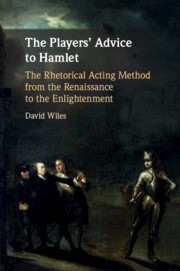 The Players' Advice to Hamlet
The Players' Advice to Hamlet Published online by Cambridge University Press: 16 January 2020
The ancient concept of ‘gesture’ had no place in the brave new world of Stanislavskian naturalism. Rhetorical gesture was understood as an adjunct of speech, hardwired to speech in the idiom of modern brain science. Classical gesture: refused to separate the physical person of the orator from his moral and intellectual capacities. The gestures of a Ciceronian speech were deemed to be implicit in the words. Renaissance gesture: raising the question of whether gesture is teachable. Shakespearean gesture: I focus on Bertram Joseph’s controversial research into gesture, and examine his work with Shakespearean actors presenting Macbeth at the Mermaid. Baroque gesture: contrasting Le Faucheur’s practice in the pulpit with the new approaches of Descartes and Le Brun. Enlightenment France: F. Riccoboni’s argument for an intelligent actor in control of his movements. Enlightenment Germany: Lessing’s desire for ‘individualizing’ gestures was not well received by actors. Engel followed Lessing in quest of detail, but Goethe return to tradition in order to find a language of the body that would support the delivery of verse.
To save this book to your Kindle, first ensure [email protected] is added to your Approved Personal Document E-mail List under your Personal Document Settings on the Manage Your Content and Devices page of your Amazon account. Then enter the ‘name’ part of your Kindle email address below. Find out more about saving to your Kindle.
Note you can select to save to either the @free.kindle.com or @kindle.com variations. ‘@free.kindle.com’ emails are free but can only be saved to your device when it is connected to wi-fi. ‘@kindle.com’ emails can be delivered even when you are not connected to wi-fi, but note that service fees apply.
Find out more about the Kindle Personal Document Service.
To save content items to your account, please confirm that you agree to abide by our usage policies. If this is the first time you use this feature, you will be asked to authorise Cambridge Core to connect with your account. Find out more about saving content to Dropbox.
To save content items to your account, please confirm that you agree to abide by our usage policies. If this is the first time you use this feature, you will be asked to authorise Cambridge Core to connect with your account. Find out more about saving content to Google Drive.